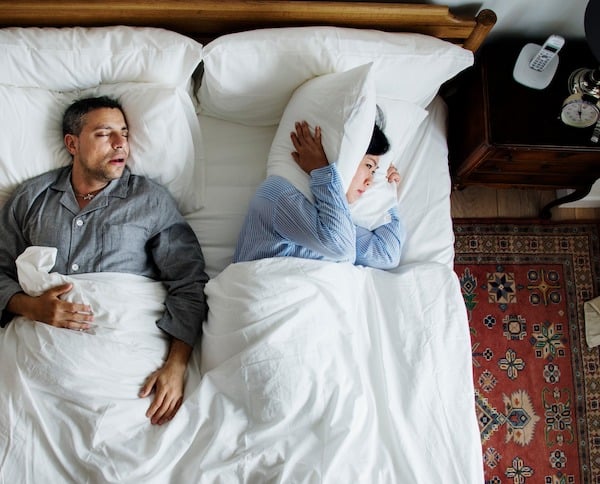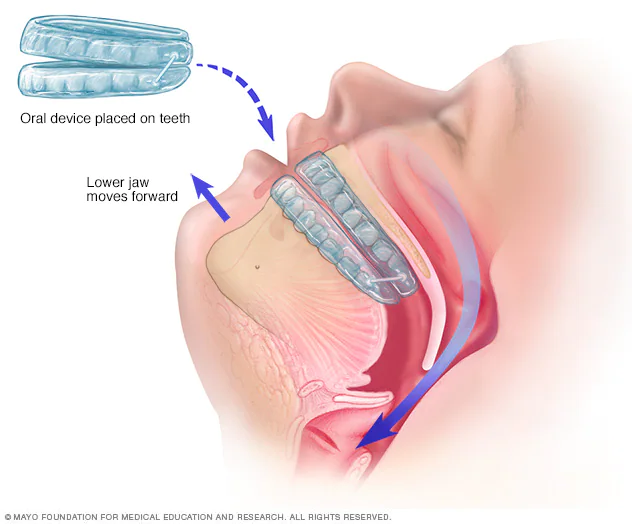
Sleep Apnea
Rest Easy with Sleep Apnea Solutions
Are you drowsy during the day with no explanation? Do you snore loudly or wake up breathless in the middle of the night? If you’re experiencing any of these symptoms, you may be one of more than 22 million Americans who are affected by sleep apnea. Sleep apnea can affect everything from your quality of sleep, to your day to day life, and can even lead to additional health complications if left untreated.
Many times when people think of medical conditions like sleep apnea, they don’t think of receiving treatment at a dental office. However, in many cases of sleep apnea problems can be solved with oral devices. If you have been diagnosed with, or you suspect you have sleep apnea, contact Broken Arrow Family Dentistry to start your jouney back to restful sleep.


What is Sleep Apnea?
Sleep apnea is a condition in which your breath stops periodically throughout the night as you sleep, as many as 20 to 30 times an hour. Each time you stop breathing in your sleep, the resulting lack of oxygen alerts your brain to the problem, waking you temporarily so that your breathing will restart.
Many times this waking is very brief, so those with sleep apnea don’t remember the constant waking. This leaves them to believe they’re getting a good night’s sleep, when in fact they’re not. The constant wake and sleep pattern prevents truly restful deep sleep, leaving the person suffering with constant sleep apnea to feel drowsy and fall asleep during the day.
Signs of Sleep Apnea
Sleep apnea is a sleep disorder that can affect anyone, and it’s important to recognize the signs and symptoms. If you or a loved one are experiencing any of these symptoms, it’s important to talk to a healthcare professional as untreated sleep apnea can lead to serious health issues.
The following symptoms can indicate the presence of sleep apnea:
- Insomnia or difficulty sleeping
- Loud snoring at night
- Waking up at night short of breath
- Snorting or choking sounds during the night (indicating a restart of breathing)
- Headaches upon waking in the morning
- Falling asleep unintentionally during the day
- Extreme drowsiness throughout the day
Common Questions
Are there different types of sleep apnea?
Sleep apnea is classified into three categories. Obstructive sleep apnea (OSA) is the most prevalent type of sleep apnea and is caused by the physical obstruction or collapse of soft tissue in the back of the throat. Central sleep apnea (CSA) is less common, and it occurs when the muscles involved in breathing don't receive proper signals from the brain, causing breathing to stop. A combination of obstructive and central sleep apnea is referred to as "mixed" or "complex" sleep apnea and is experienced by some individuals.
What are the risk factors for sleep apnea?
Sleep apnea is a condition that can affect anyone, regardless of age or gender, although obstructive sleep apnea is more prevalent in males and older adults aged 40 and above. Obesity, smoking, alcohol consumption, and the use of sedatives or tranquilizers are risk factors associated with this type of sleep apnea. In contrast, central sleep apnea typically affects individuals with heart or neuromuscular disorders, strokes, or brain tumors.
Can sleep apnea be dangerous?
Sleep apnea is a severe medical condition, and if not treated, it can result in high blood pressure, enhancing the possibility of heart failure and stroke. The continuous fatigue caused by sleep apnea can lead to difficulties at work or school, as well as dangerous situations when driving or handling heavy machinery. Additionally, sleep apnea can cause complications with medication or surgery, and sedation by anesthesia can be risky, as well as lying flat in bed after an operation.
How Does a Dentist Treat Sleep Apnea?
Dentists play an important role in the treatment of sleep apnea. At Broken Arrow Family Dentistry, we will first refer a patient to a sleep specialist for a formal diagnosis. Once diagnosed, we will create a custom oral device to help alleviate symptoms.
These devices are typically worn during sleep and work by repositioning the jaw and tongue to keep the airway open. The goal is to keep the airway from becoming blocked or collapsed, which reduces the frequency and severity of apneas. Dr. Trammell will work closely with you to ensure that the oral device is comfortable and effective. By working with a specialist, we can help improve your quality of sleep and overall health.
